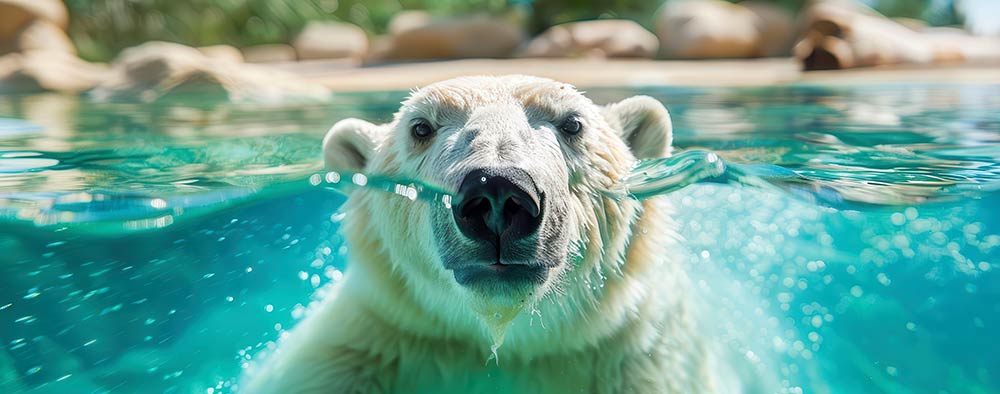by Susan Stamper •
Content Marketing Manager, ChiroHealthUSA •
With a frigid cold front sweeping the country, it’s time to talk about something as timely as it is icy: cold water immersion. ❄️ Sure, the idea of willingly plunging yourself into freezing water might sound downright bananas—especially when the weather seems to be doing the job for you. And if you’ve ever tubed down the Chattahoochee River midsummer, you know what a shock the cold water can be! But hear me out! Cold water immersion—or CWI for those who love a good acronym—isn’t just for Instagram daredevils, accidental plunges off tubes, or athletes with something to prove. It’s a practice gaining traction for its potential to boost both mental and physical health. So, as we brace for Mother Nature’s icy embrace, why not lean into the freeze and explore how it can actually do your body (and mind) some good?
The Basics of Cold Water Immersion
In simplest terms, CWI involves immersing your body in cold water—usually between 50 and 59 degrees Fahrenheit. 🧊 It’s often done after exercise, but people also swear by it as a standalone practice for mental clarity and overall wellness. Imagine the potential of something so simple providing mental clarity and focus! While the idea of plunging into icy water might make you shiver in protest, research suggests the benefits might be worth the chill. 🌊
Benefit #1: A Cold Splash for Mental Health
If you’ve ever felt your mood lift after braving a cold shower, you’re not imagining things. 🛁 Cold water immersion has been linked to improved mental health. According to a Stanford Lifestyle Medicine Center study, the practice triggers the release of feel-good chemicals like dopamine and endorphins. These are the same neurotransmitters responsible for that post-workout high, except you don’t have to run a single mile.
Another study published in Psychiatric Neuropsychology (2024) points out that cold exposure can significantly reduce symptoms of depression and anxiety. The theory is that cold water activates the vagus nerve, critical in stress regulation. Think of it as a reset button for your frazzled nervous system. 🌟 But—and this is important—always talk to your doctor before making icy dips your go-to mental health remedy.
Benefit #2: Post-Workout Recovery That’s Cooler Than Ever
If you’ve seen pro athletes hopping into ice baths after games, it’s not just for show. Cold water immersion is a proven way to reduce muscle soreness and inflammation. 💪 Mayo Clinic researchers explain that the cold constricts blood vessels, reducing swelling, and then flushes out metabolic waste when the body warms back up.
A systematic review published on PubMed Central (PMC) highlights that athletes who used cold immersion reported less muscle soreness and faster recovery times. Whether you’re training for a marathon or just survived your first boot camp, this could be the secret weapon your quads are begging for. 🏃♀️
Benefit #3: Immune System Perks
Feeling run down? Some evidence suggests cold water immersion might give your immune system a boost. Regular cold exposure has been linked to increased production of white blood cells, which are your body’s frontline defenders against illness. While this doesn’t mean you’ll suddenly become invincible, it’s a pretty cool bonus (pun absolutely intended). 😷
Benefit #4: Sharpened Focus and Energy
Ever jumped into cold water and felt like your brain just flipped a switch? 💡 That’s because cold water immersion kicks your sympathetic nervous system into high gear, enhancing alertness and energy levels. NPR’s Health Shots notes this could be a game-changer for anyone struggling with morning grogginess. Bonus: It’s cheaper than coffee and might even outlast your triple espresso in terms of effectiveness. ☕
The (Icy) Elephant in the Room: Is It Safe?
Before sprinting toward the nearest ice bath, let’s address the real risks. ⚠️ Cold water immersion isn’t for everyone. People with heart conditions, Raynaud’s disease, or certain circulatory issues should steer clear. Even for the average person, it’s crucial to start slow. Experts from Mayo Clinic recommend limiting initial plunges to a minute or two and gradually increasing exposure as your body adapts.
And—this bears repeating—always consult your doctor before starting any new wellness routine. Your health is not one-size-fits-all, and what works for an NFL linebacker might not be ideal for your post-Zumba recovery. 🩺
How to Get Started Without Turning into a Human Popsicle
- Start Small: Begin with cold showers before graduating to full immersion. Let the cold water hit your feet first, then gradually move upward. 🚿
- Time It Right: Aim for 1-3 minutes of exposure to reap benefits without overdoing it. Trust me, your body will thank you. ⏱️
- Choose the Right Setting: Whether it’s a fancy cryotherapy spa or your trusty bathtub filled with ice cubes, pick a method that suits your budget and comfort level. 🛁
- Buddy Up: Cold water immersion can be more tolerable—and fun—with a friend. Plus, they can keep an eye on you to ensure you don’t overstay your icy welcome. 👯♂️
- Stay Consistent: Like any health habit, consistency is key. Aim for 2-3 sessions per week to maximize benefits. 📅
Conclusion: Should You Take the Plunge?
Cold water immersion isn’t a miracle cure, but it’s a promising tool in the wellness toolbox. 🧰 From mental clarity to muscle recovery, the potential benefits are as invigorating as the practice itself. That said, it’s not a one-size-fits-all solution. Always consult your doctor before starting, especially if you have underlying health conditions. 🩺
So, are you ready to chill out and embrace the freeze? ❄️ Whether you want to level up your workouts or boost your mood, cold water immersion might be the coolest thing you try this year. 🧊 Cooler than the flip-side of your pillow, at least!
References
Mayo Clinic Health System. (n.d.). Cold plunge after workouts. Mayo Clinic Health System. Retrieved from https://www.mayoclinichealthsystem.org/hometown-health/speaking-of-health/cold-plunge-after-workouts
National Public Radio. (2023, October 8). Cold plunge: Health benefits & how to. NPR. Retrieved from https://www.npr.org/sections/health-shots/2023/10/08/1204411415/cold-plunge-health-benefits-how-to
Psychiatric Neuropsychology. (2024). Cold water immersion and its effects on mental health. Psychiatric Neuropsychology. Retrieved from https://psychiatryonline.org/doi/full/10.1176/appi.neuropsych.20240053
Stanford Lifestyle Medicine Center. (2024, May 22). Jumping into the ice bath trend: Mental health benefits of cold water immersion. Retrieved from https://longevity.stanford.edu/lifestyle/2024/05/22/jumping-into-the-ice-bath-trend-mental-health-benefits-of-cold-water-immersion/
PubMed Central. (n.d.). Systematic review of cold water immersion benefits. Retrieved from https://pmc.ncbi.nlm.nih.gov/articles/PMC9518606/#s0005








